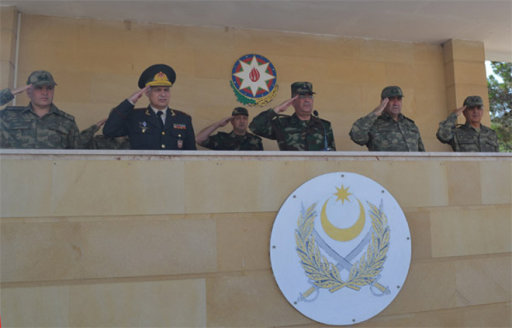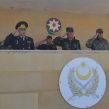
The Puzzle of Regional Tensions: Media Perceptions of Turkish-Azerbaijani Joint Military Exercises
Publication: Eurasia Daily Monitor Volume: 10 Issue: 139
By:

The militaries of Turkey and Azerbaijan carried out joint exercises between July 12 and 28, in the latter country’s capital of Baku and its autonomous exclave of Nakhchivan (Hurriyet Daily News, July 15). In the midst of the exercises (July 16–17), Turkish Foreign Minister Ahmet Davutoglu visited Baku to discuss a range of issues at the heart of bilateral Turkish-Azerbaijani relations, and openly criticized the failure of the Organization for Security and Cooperation in Europe’s (OSCE) Minsk Group to make any real progress in resolving the Karabakh conflict (Turkish Ministry of Foreign Affairs, July 17). The central aim of Davutoglu’s visit was to discuss preparations for both the Turkey-Azerbaijan High Level Strategic Cooperation Council meetings (scheduled for November), and the planned visit to Azerbaijan by Turkish President Abdullah Gul in August.
Local media outlets have linked these latest Turkish-Azerbaijani military drills to a number of other significant regional developments. First of all, Armenian Prosecutor General Agvan Ovsepyan made territorial claims on Turkey a few days before the start of the joint Turkish-Azerbaijani exercise (Milliyet, July 13). Furthermore, as reported by Today’s Zaman on July 24, Russia is expanding its military relations with Armenia while at the same time putting pressure on Azerbaijan to join the so-called Eurasian Union. Finally, the Iranian navy has been conducting its own military exercises on the Caspian Sea during July 8¬–12. However, two of these connections drawn by the media seem tenuous; it is unlikely that the latest Turkish-Azerbaijani joint military drill was conducted in response to either Armenia’s threats about Turkish territory or Iran’s naval training exercises.
First of all, the joint military exercises were planned in advance (July 2–4, days before the start of Iran’s naval drills) as part of an inter-governmental memo on mutual understanding between Azerbaijan and Turkey, signed by high-level military officials and approved by presidential signatures. These joint exercises were among the concrete results of the “Agreement on Mutual Military Training and Education,” which the two countries signed back in August 1992, and later strengthened with additional agreements. Moreover, this month’s joint exercises were limited to one rifle brigade from the Azerbaijani Armed Forces and one Turkish detachment— and they did not test the naval capabilities of either country, unlike Iran’s July Caspian Sea exercise. Turkey and Azerbaijan have, for many years, participated in joint drills along with several other countries; for instance, at the same time as the Baku-Nakhchivan training exercises, Azerbaijani and Turkish forces participated in the “Sea Breeze 2013” naval exercise, hosted by Ukraine in the Black Sea between July 8 and 20 (The General Staff of the Republic of Turkey, July 8).
Second, joint Turkish-Azerbaijani military exercises would not have been carried out as a response to Armenia’s threats. When responding to Yerevan’s unilateral provocations, Baku generally prefers to act alone. Furthermore, Azerbaijan wants to show that it has the independent military capacity to liberate its occupied territories, without needing help from its ally. Recent examples of this include the June 26 Armed Forces’ Day military parade (APA, June 26) and conducting military exercises in the neighborhood of the occupied territories, as happened in mid-May (Radio Free Europe, May 14).
Rather, the Turkish-Azerbaijani strategic alliance seeks to neutralize Armenia’s military cooperation with Russia. Baku and Ankara signed the 2010 “Agreement on Strategic Partnership and Mutual Assistance” (https://news.az/articles/21081) just days before Yerevan and Moscow signed an agreement to extend Russia’s lease of its military bases in Armenia. The Baku-Ankara agreement prioritized security cooperation using the military, including all necessary measures within the existing framework for the purpose of mutual assistance in the event of a military attack or act of aggression against either country. But while Azerbaijan perceives its increasing security cooperation with Turkey as a means of balancing Russian-Armenian military cooperation, a discrete consequence of this strategy is that Ankara ends up balancing Moscow’s efforts in the South Caucasus. The Russian Federation retains another strategy for regional influence, however—a type of “bait balance” game, whereby Russia aids Azerbaijan in order to send a message to Armenia, subsequently pushing Yerevan into signing agreements with Moscow, thus increasing Armenia’s dependence.
Another issue to keep in mind is the history of Turkish-Azerbaijani military cooperation, which has long been institutionalized, notably bolstered by the aforementioned 2010 agreement. Under its current strategy, Baku is focusing on broadening cooperation with its closest partners, including Georgia (Civil.ge, March 28), and it is in this context that the Baku-Ankara military cooperation is especially visible, strengthening historical aspects such as joint military training drills, as well as Baku’s increased cooperation with Turkey’s much stronger defense industry.
The notion that the Turkish-Azerbaijani joint military exercises were carried out in response to sudden concurrent regional developments relies on a series of misunderstandings of the regional actors’ political agendas. First, President Vladimir Putin’s long expected, though not yet officially confirmed, visit to Baku is likely to occur next month. On the eve of this visit, it is not in Baku’s interests to increase tensions with Moscow. Just prior to the Turkish-Azerbaijani joint exercises, the president of the Russian oil company Rosneft, Igor Sechin, was in Baku (News.az, July 5), after which the news about President Putin’s possible visit was made public.
Additionally, aside from the issue of current regional tensions, it is in Baku’s interests not to antagonize Iran, even as Tehran tries to continue its “military show” in the Caspian Sea. Thus Baku’s approach is to wait and see the results of the inauguration of the newly elected President Hassan Rouhani on August 4. Rouhani’s inauguration messages to the West and the region will be key; the belief among the Azerbaijani ruling elite is that if Iran wishes to improve relations with the United States and the West, it must simultaneously establish cordial relations with Azerbaijan. Following this reasoning, Azerbaijan’s approach is to minimize tensions with both Russia and Iran. The joint military drills must be viewed within this larger regional picture, and not as simple responses to sudden flashes of tension in the South Caucasus; the chain of causality is not as simple as the local media asserts.




